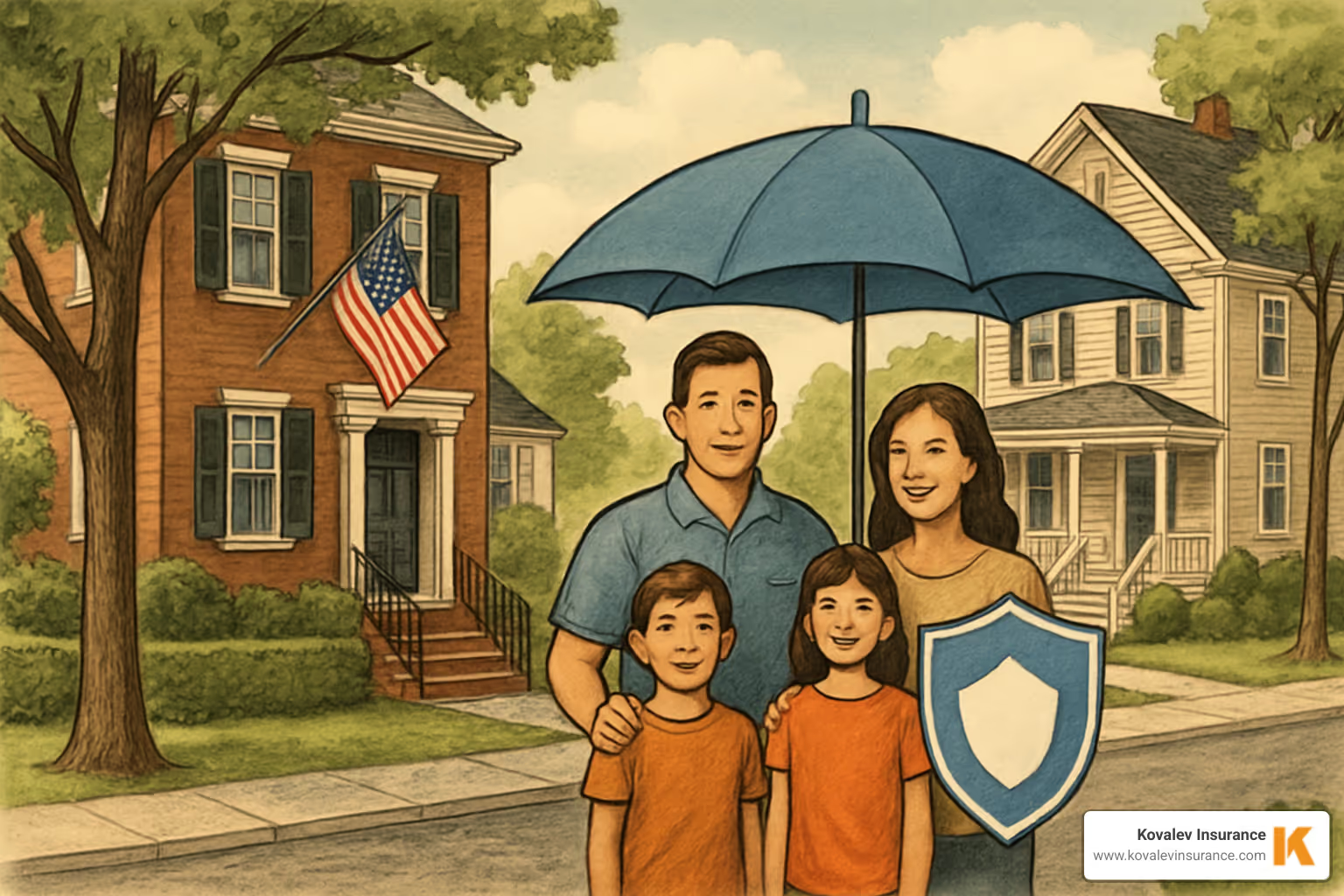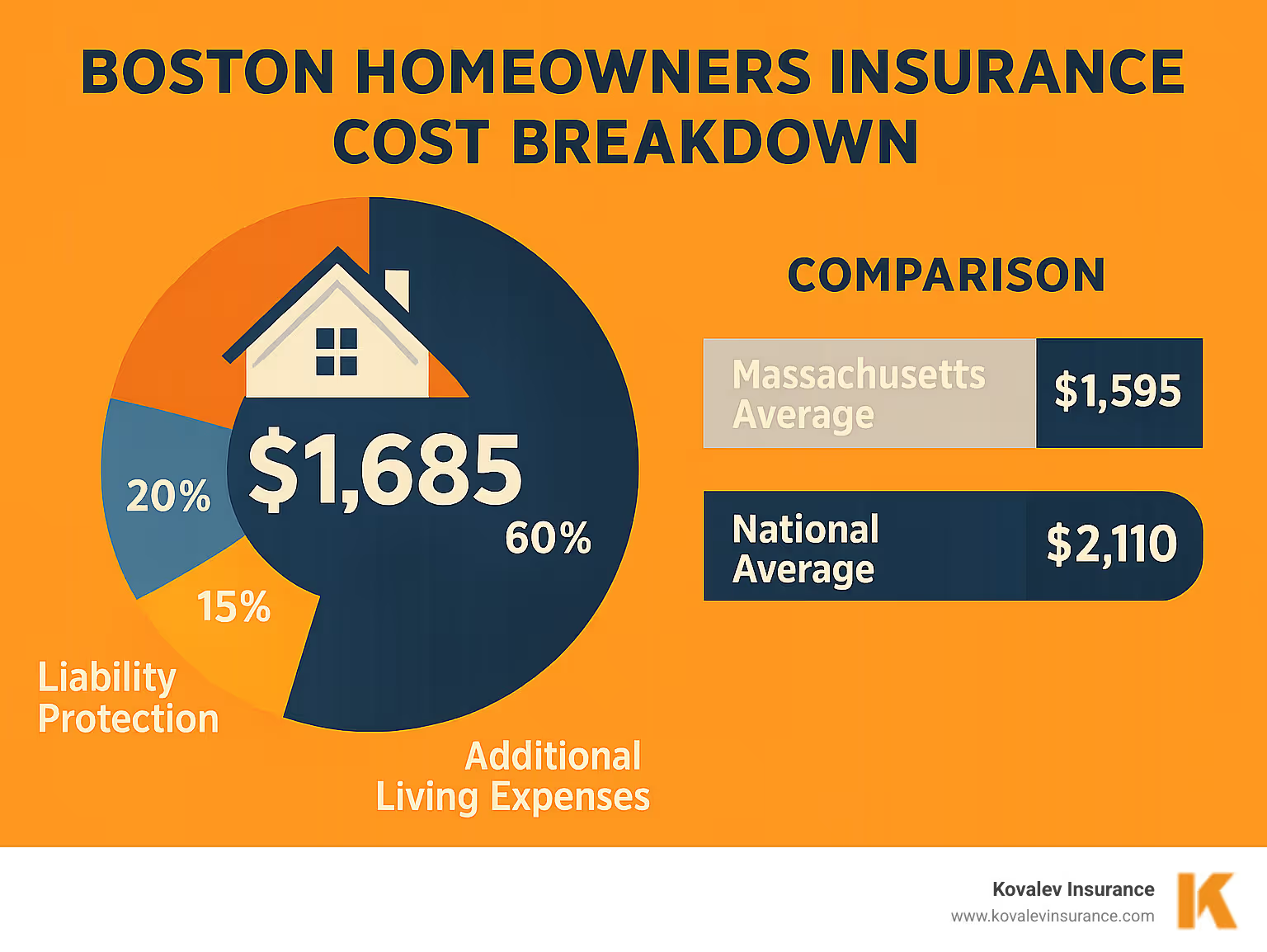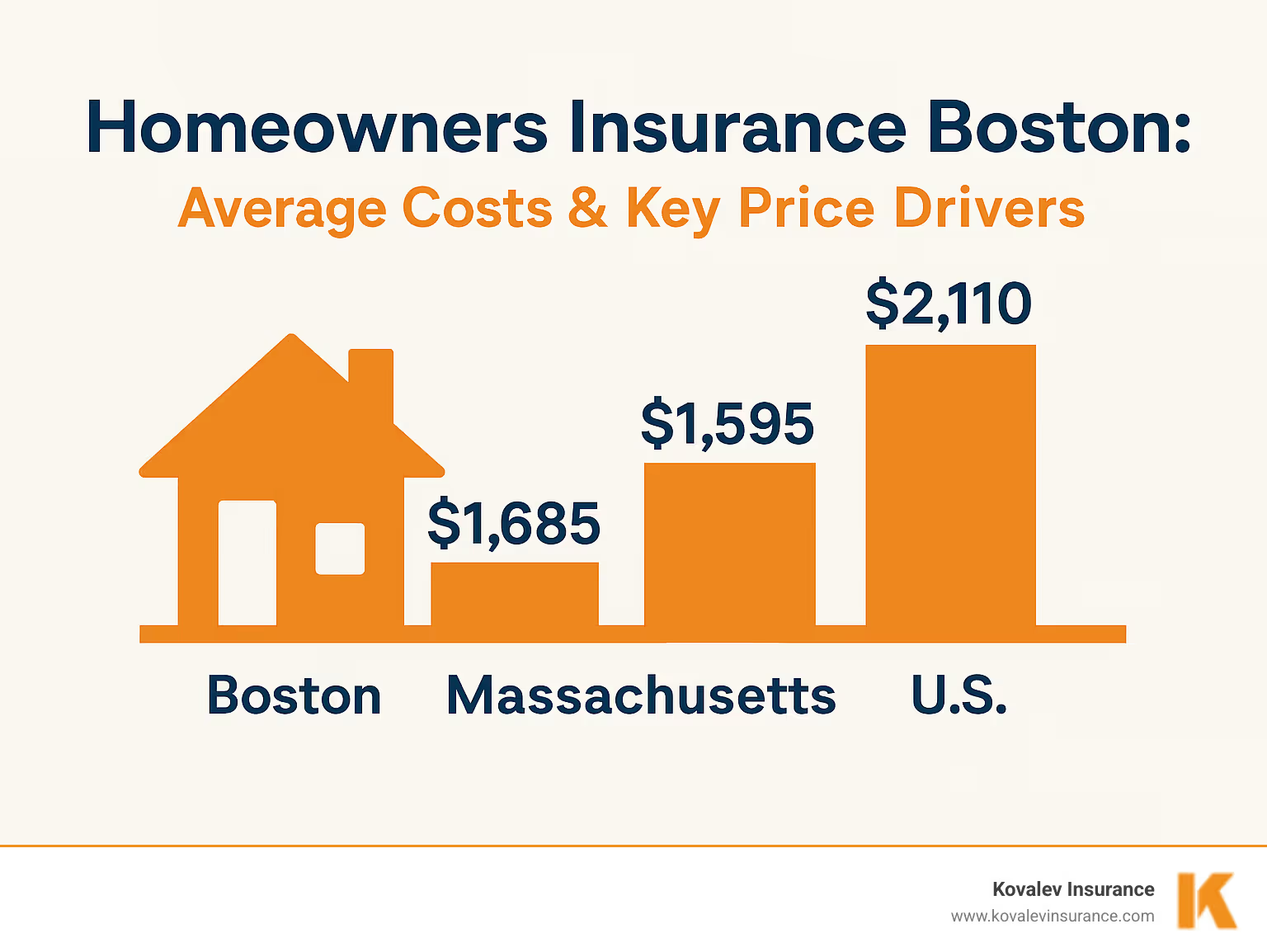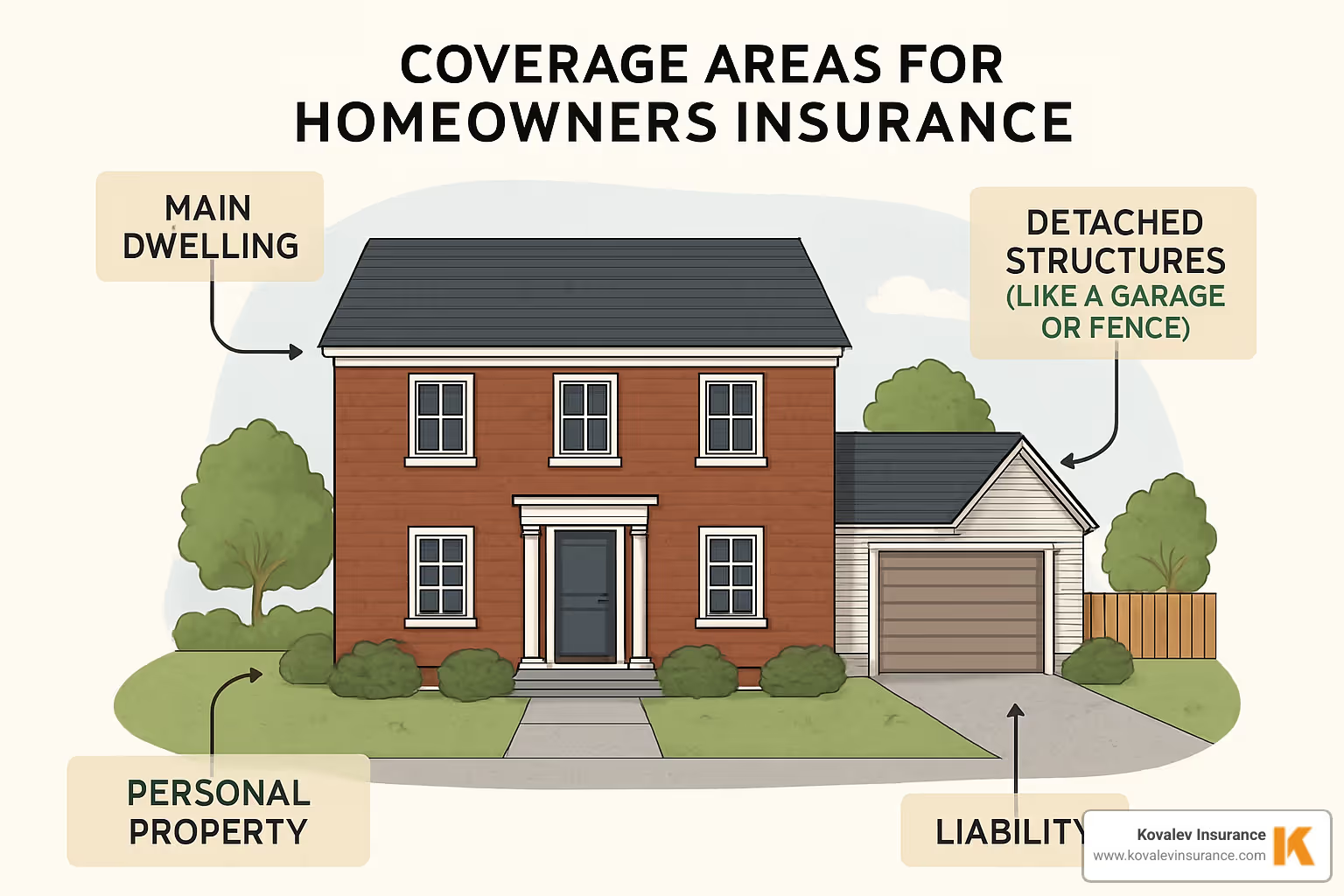Blog Content
19
Jun
2025

Homeowners insurance boston residents purchase protects against everything from nor'easters to kitchen fires in one of America's most historic—and weather-challenged—cities. Boston homeowners face unique risks that make comprehensive coverage essential for protecting their investment.
Top Boston homeowners insurance facts and average costs:
• Average annual premium: $1,685 (vs. $1,595 statewide, $2,110 nationally)• Leading coverage types: Dwelling, personal property, liability, additional living expenses• Must-have add-ons: Flood insurance, water backup, umbrella liability• Money-saving tip: Bundle home and auto for up to 16% discount• Local risk factors: Coastal storms, winter weather, aging infrastructure
Boston's position on the Atlantic coast brings serious weather risks. The city leads the nation in kitchen fires per capita, while harsh winters create ice dams and frozen pipe claims. Massachusetts has experienced 45 confirmed weather disasters since 1980, including devastating nor'easters and winter storms that can leave homes uninhabitable for weeks.
Whether you're buying a brownstone in Back Bay or a colonial in Newton, Wellesley, Brookline, Needham, Belmont, or Natick, the right insurance policy protects your biggest asset. Massachusetts law doesn't require homeowners insurance, but mortgage lenders do—and even paid-off homeowners need protection against liability claims and catastrophic losses.
The average single-family home in Massachusetts costs nearly $620,000, making adequate coverage crucial. Yet 5% of Bay State homes remain uninsured, putting families at financial risk. This gap in coverage often stems from homeowners not understanding their options or assuming they can't afford proper protection.
Our experience serving Newton, Wellesley, Brookline, Needham, Belmont, and Natick has taught us that every neighborhood presents unique challenges. From the coastal exposure in certain areas to the historic home preservation needs in others, we understand the specific risks that Massachusetts homeowners face daily.

Simple guide to homeowners insurance boston terms:
Living in Boston means weathering some serious storms—literally. Nor'easters can knock out power for weeks, leaving families scrambling for heat and hot meals. Summer brings its own drama with thunderstorms that drop golf-ball-sized hail, turning your roof into Swiss cheese in minutes. Then there's hurricane season, which sends coastal surge flooding into neighborhoods that never expected to see saltwater.
But here's something that might surprise you: Massachusetts leads the entire country in kitchen fires per capita. That's right—we Bay State folks are apparently more adventurous cooks than the rest of America, and not always in a good way. Add our brutal winters that freeze pipes solid and create ice dams thick enough to walk on, and you've got a recipe for insurance claims that's uniquely Boston.
Homeowners insurance Boston residents carry isn't just smart—it's essential for protecting your investment. While Massachusetts law doesn't actually require you to have coverage, good luck finding a mortgage lender who'll work without it. Even if you've paid off that colonial in Newton or brownstone in Brookline, you still need protection from liability claims. One slip on your icy front steps could cost you hundreds of thousands in lawsuit damages.
The reality is that homeowners in Wellesley, Needham, Belmont, and Natick face the same weather risks as Boston proper. A nor'easter doesn't check your ZIP code before dumping three feet of snow on your roof.
Coastal surge doesn't just threaten waterfront mansions—it can flood homes miles inland when major storms overwhelm our aging drainage systems. We've seen neighborhoods in Newton and Needham turn into temporary lakes during particularly nasty weather events.
Ice dams form when your roof becomes a giant ice cube tray. Snow melts from heat escaping your house, then refreezes at the roof's edge. That ice acts like a dam, forcing water to back up under your shingles and leak into your home. It's like Mother Nature's cruel joke on New England homeowners.
Our claims statistics tell the story: frozen pipes consistently rank in the top three causes of homeowners insurance claims across Massachusetts. Severe storms bring a triple threat of wind damage, hail destruction, and power outages that can spoil a freezer full of food and fry expensive electronics when the power surges back on.
Your dwelling coverage should equal your home's full replacement cost—not what you could sell it for tomorrow. This distinction matters more than you might think. With construction costs rising faster than home values in some areas, rebuilding often costs significantly more than your home's market price. In expensive towns like Wellesley and Brookline, this gap can be eye-opening.
Liability coverage between $300,000 and $500,000 should be your starting point, not your destination. Given Massachusetts' high property values and our state's lawsuit-friendly legal environment, many smart homeowners carry umbrella policies extending their liability protection to $1 million or more.
Don't guess at your personal property inventory—actually count it up. Most homeowners drastically underestimate what it would cost to replace everything they own. That "stuff" in your closets, basement, and garage adds up faster than you'd expect when you're buying it all again after a total loss.
If you're shopping for homeowners insurance boston coverage, you'll be pleased to know that local rates are quite reasonable compared to the rest of the country. Bay State homeowners pay an average of $1,685 annually, which sits just above the Massachusetts average of $1,595 but comes in a whopping 24% below the national average of $2,110.
This savings reflects Massachusetts' relatively stable weather patterns and strong building codes that help keep claims manageable. However, don't expect every neighborhood to hit that average—costs can swing dramatically depending on where exactly you call home.
Within the Boston metro area, ZIP code location makes a huge difference in your premium. We've seen rates as low as $1,241 in some protected inland areas, while coastal zones prone to storm surge can push premiums over $1,600. Construction costs in our region run higher than many parts of the country, which bumps up the replacement cost calculations that form the foundation of your dwelling coverage.
Proximity to the coast adds another layer of risk pricing. Even homes a few miles inland can see liftd rates during hurricane season, as we've learned from past storms that brought flooding well beyond the immediate waterfront.
Your claims history packs a serious punch when it comes to pricing. Massachusetts homeowners with one recent claim face an average annual premium of $1,850—that's a 16% increase over their claim-free neighbors. This penalty typically sticks around for three to five years, making smart prevention and risk mitigation essential for keeping long-term costs manageable.

Homeowners insurance boston area shopping reveals some interesting patterns when you compare neighboring communities. Newton residents typically enjoy slightly lower premiums than the Boston average, thanks to excellent fire protection services and lower crime rates. Meanwhile, Wellesley homeowners often see higher costs due to liftd property values that require more substantial dwelling coverage.
The coverage level you choose creates the biggest impact on your annual bill. A modest home requiring $100,000 in dwelling coverage might cost around $683 annually, while a property needing $400,000 in protection jumps to approximately $1,641. Most homes in Newton, Wellesley, and Brookline fall into the $300,000 to $600,000 dwelling coverage range, putting typical annual premiums between $1,200 and $2,400.
Deductible selection offers one of the easiest ways to control costs. Bumping your deductible from $500 to $5,000 can slash your annual premium from $1,329 down to $892—a savings of $437 every year. Just make sure you've got enough in your emergency fund to cover that higher out-of-pocket cost if you need to file a claim.
Home age influences your rates, but condition trumps the calendar every time. A lovingly maintained 1920s colonial in Belmont might actually cost less to insure than a neglected 1990s house with outdated electrical and plumbing systems. Insurers care more about risk factors than historical charm.
Roof condition deserves special attention since it's often the first thing insurers scrutinize. Many companies require replacement of roofs over 20 years old, especially if they show signs of wear. A new roof can actually earn you discounts while protecting your biggest investment.
Distance from fire stations plays a bigger role in suburban communities like Natick and Needham. Homes within five miles of professional fire departments typically qualify for better rates than those relying on volunteer departments. Response time matters when every minute counts during an emergency.
Your credit score also influences pricing in Massachusetts, with excellent credit earning meaningful discounts. Previous claims history follows you through industry databases for three to seven years, even if you switch insurers or move to a different address. This makes choosing your coverage levels and deductibles thoughtfully important for managing long-term costs effectively.
Think of a homeowners insurance boston policy like a house: you start with a frame (Coverages A–F) and then decide which upgrades you really need for life in Massachusetts.
Core coverages (the “frame”):

Other handy endorsements: green-rebuild, valuable-items riders, identity-theft, ordinance & law, and home-cyber coverage. Pick the ones that match your budget and risk profile—no need to buy everything, but skipping flood or water-backup in Massachusetts is rarely a good idea.
Shopping smart can shave hundreds off a homeowners insurance boston premium. Here’s a streamlined look at your options:
Get home insurance quotes • Division of Insurance resources
A clean, well-maintained home within five miles of a staffed fire station and bundled with auto coverage usually lands the best rate.
Nobody wants to overpay for homeowners insurance boston coverage. Focus on risk-reduction—not coverage-reduction—and you can keep costs in check without leaving gaps.

Even small moves matter: set up automatic payments (small discount), pay annually instead of monthly (no installment fees), and ask about alumni or professional-group pricing. Saving a few percent in multiple places often beats chasing one giant discount.
The Commonwealth doesn’t mandate it, but lenders do, and going bare exposes you to six-figure liability suits. Coverage is smart even after you burn the mortgage note.
No. Buy a separate flood policy (highly recommended across Greater Boston) and add earthquake if you want shake protection—both are optional but fill big gaps.
Re-shop annually with an independent local insurance agent, but avoid hopping carriers every year; long claim-free tenure can open up loyalty discounts.
Finding the right homeowners insurance boston protection doesn't have to feel overwhelming. Yes, we face unique challenges here—from those infamous nor'easters that knock out power for days to our state's puzzling lead in kitchen fires. But with average premiums of $1,685 annually, Boston homeowners actually get solid value for comprehensive coverage that protects against both weather disasters and costly liability claims.
The secret sauce is matching your coverage to where you actually live and what risks you really face. If you're near the coast, flood protection isn't optional—it's essential. Living inland in Newton or Needham? Focus on freeze protection and wind damage coverage. No matter where you call home in the Boston area, everyone benefits from robust liability coverage and dwelling limits based on what it would actually cost to rebuild, not what your home might sell for.
Here's what I've learned after helping thousands of families across Newton, Wellesley, Brookline, Needham, Belmont, and Natick: the best insurance policy is one you understand completely. That means working with agents who know Massachusetts inside and out—from our quirky weather patterns to state-specific coverage requirements and the discounts that can actually save you money.
At Kovalev Insurance, we've been navigating Boston-area risks and coverage needs for years. Our team doesn't just sell policies; we take the time to understand your specific situation and find protection that fits your family and your budget. After all, your home is probably your biggest investment—it deserves insurance that's just as thoughtful.
Ready to explore your options? We're here to help you secure the coverage your family needs, with the personal touch that makes all the difference.
X